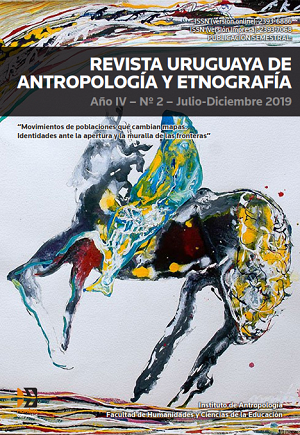Avances de Investigación
Published 2019-12-19
How to Cite
Machín Álvarez, L. I. (2019). Gender, traditional music, and taboos in western Africa’s Mande society. Uruguayan Review of Anthropology and Ethnography On Line: ISSN 2393-6886, 4(2), 119–127. https://doi.org/10.29112/ruae.v4i2.513
Abstract
Western African bard, women have the reputation to be outstanding singers, but playing instruments
is traditionally an exclusively male pursuit. Jàli’s art have been passed down through
many centuries, and the profession of musician is inherited, but women access to certain
instruments like kóoraa is controversial: playing it can be risky. Traditionally, they play some
rhythmic instruments – and only to accompany their songs, but not string instruments. What is
the impact of female players’ performance in this society?
Downloads
Download data is not yet available.
References
Alvarez, Laura M. 2011a. “Importance des panégyriques en Afrique de l’Ouest: l’art oral des
griottes mandingues du Sénégal”, in K. V. Lexander, C. Lyche & A. M. Knutsen (eds.)
Pluralité des langues, pluralité des cultures:regards sur l’Afrique et au-delà. Mélanges
offerts à Ingse Skattum à l’occasion de son 70ème anniversaire. Oslo, Novus: 13-25
______.
2011b. ”Ordets makt hos muslimske kvinnelige barder”. http://www.masterbloggen.
no/blog/2011/05/01/ordets-makt-hos-muslimske-kvinnelige-barder/
______.
2008. Être griotte en Casamance aujourd’hui : Analyse des conditions du
métier et du contenu des griottes mandingues. Master’s thesis. Oslo, University of Oslo.
Battuta, Ibn. 1929. Travels in Asia and Africa, 1325-1354. London, Routledge.
Bebey, Francis. 1975. African Music: A People’s Art. New York, Lawrence Hill & Co.
Becker, Joffrey. 2005. La musique entre ciel et terre : Une conception particulière de la relation
humain-environnement. [Consultado en línea el 07.12.2008].
Camara, Sory. 1992. Gens de la parole. Essai sur la condition et le rôle des griots dans la
société malinké. Paris, Karthala. (1a ed. 1976 en Mouton).
Daff, Moussa et al. 2006. Les mots du patrimoine : le Sénégal. Paris, Editions des archives
contemporaines.
Dilworth, Molly C. 2008. “La kora: The Conflicts between Griots and Non-Griots and the Role
of the Kora in the Modernization of Music in Senegal. Dakar, American Cultural Studies”.
[en línea]. [Consultado el 04.09.2019].
https://digitalcollections.sit.edu/cgi/viewcontent.cgi?referer=https://www.google.com/&httpsr
edir=1&article=1670&context=isp_collection
Djedje, Jacqueline C. 1985. “Women and Music in Sudanic Africa” in Irene V. Jackson (ed.):
More than Drumming: Essays on African and Afro-Latin American Music and
Musicians. Westport/London, Greenwood Press: 67-89.
Doubleday, Veronica. 2008. “Sounds of Power: An Overview of Musical Instruments and
Gender”, in Ethnomusicology Forum, vol. 17, no 1. Taylor & Francis, Ltd, British Forum
for Ethnomusicology: 6-15.
22. Charla
griottes mandingues du Sénégal”, in K. V. Lexander, C. Lyche & A. M. Knutsen (eds.)
Pluralité des langues, pluralité des cultures:regards sur l’Afrique et au-delà. Mélanges
offerts à Ingse Skattum à l’occasion de son 70ème anniversaire. Oslo, Novus: 13-25
______.
2011b. ”Ordets makt hos muslimske kvinnelige barder”. http://www.masterbloggen.
no/blog/2011/05/01/ordets-makt-hos-muslimske-kvinnelige-barder/
______.
2008. Être griotte en Casamance aujourd’hui : Analyse des conditions du
métier et du contenu des griottes mandingues. Master’s thesis. Oslo, University of Oslo.
Battuta, Ibn. 1929. Travels in Asia and Africa, 1325-1354. London, Routledge.
Bebey, Francis. 1975. African Music: A People’s Art. New York, Lawrence Hill & Co.
Becker, Joffrey. 2005. La musique entre ciel et terre : Une conception particulière de la relation
humain-environnement. [Consultado en línea el 07.12.2008].
Camara, Sory. 1992. Gens de la parole. Essai sur la condition et le rôle des griots dans la
société malinké. Paris, Karthala. (1a ed. 1976 en Mouton).
Daff, Moussa et al. 2006. Les mots du patrimoine : le Sénégal. Paris, Editions des archives
contemporaines.
Dilworth, Molly C. 2008. “La kora: The Conflicts between Griots and Non-Griots and the Role
of the Kora in the Modernization of Music in Senegal. Dakar, American Cultural Studies”.
[en línea]. [Consultado el 04.09.2019].
https://digitalcollections.sit.edu/cgi/viewcontent.cgi?referer=https://www.google.com/&httpsr
edir=1&article=1670&context=isp_collection
Djedje, Jacqueline C. 1985. “Women and Music in Sudanic Africa” in Irene V. Jackson (ed.):
More than Drumming: Essays on African and Afro-Latin American Music and
Musicians. Westport/London, Greenwood Press: 67-89.
Doubleday, Veronica. 2008. “Sounds of Power: An Overview of Musical Instruments and
Gender”, in Ethnomusicology Forum, vol. 17, no 1. Taylor & Francis, Ltd, British Forum
for Ethnomusicology: 6-15.
22. Charla






